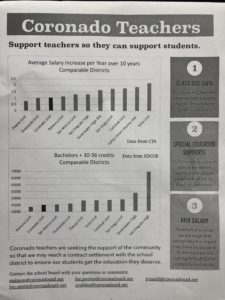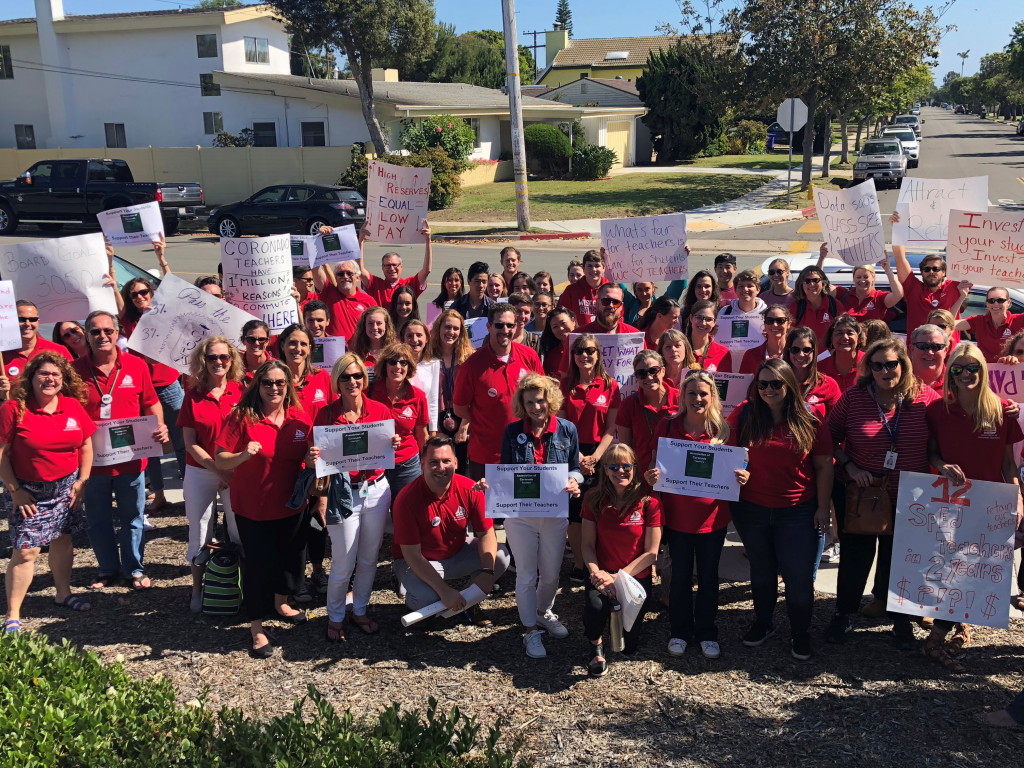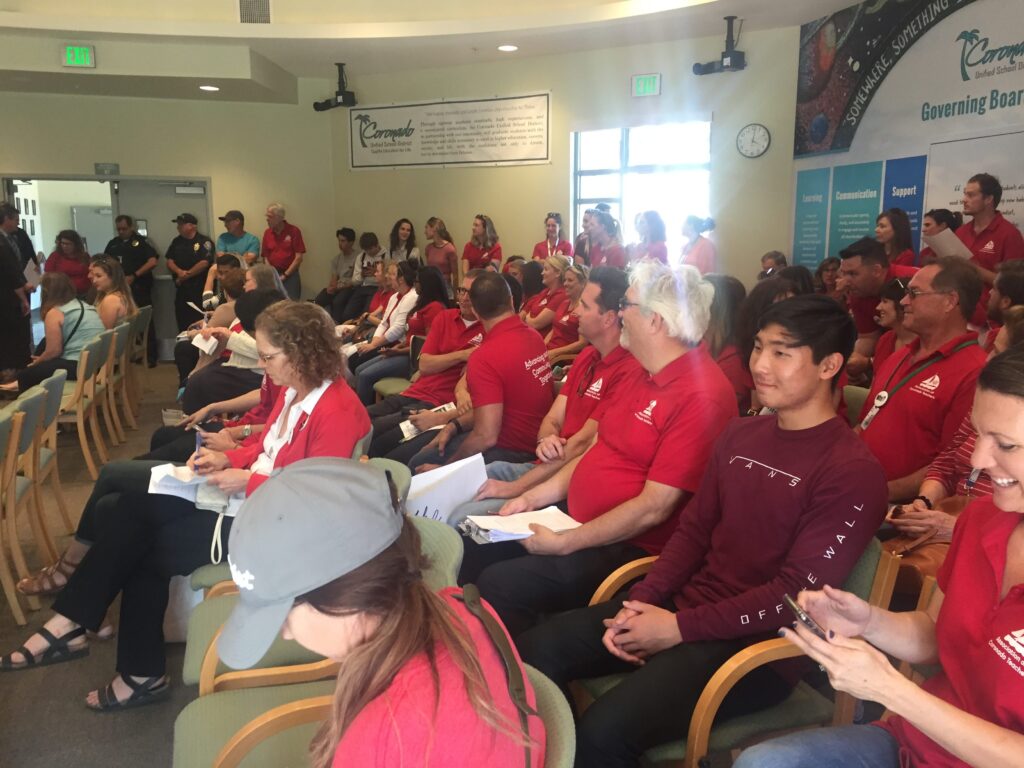Last Thursday, the Association of Coronado Teachers (ACT) advocated for change in the Coronado Unified School District’s (CUSD) policies. In a school district where we pride ourselves on the education given to our youth, there have been issues raised by teachers all over the district regarding the work environment provided by the district. Coronado teachers marched to the board meeting on Thursday, June 7th to address these issues in front of the school board, acting in the best interests of the students.
For several months prior, teachers have been raising awareness of these conditions by assembling on Orange Avenue, as well as other public streets on Coronado. Around campus, the faculty wears pins reading “Why?” or “Respect” to spark conversations with the students and the community about these issues. Engaging in this conversation, teachers have shared that every year, the teachers’ union and the district open and amend certain articles within their contract. While there have been some tentative changes, the negotiation teams have failed to come to an agreement on fair compensation/salary for teachers, a definition for co-teaching, and class size.
Salary:
Primarily, the most discussed topic is the matter of salary, as it affects the entire union. After speaking to both the district and the ACT, it is understandable that this issue is never simple. The ACT has grieved that they are one of the lowest paid school districts in San Diego County, and teacher retention has progressively become more and more difficult. “We have a lot of education as professionals, and we don’t feel that we’re compensated for that adequately, especially compared to our neighboring districts,” says Amanda Vanasse, Science Department and one of the members on the negotiation team.
 Lack of teacher retention is a direct result of this lower salary in comparison with other districts in the county. Reasonably so, it is hard to argue that teachers should not move to another district if they can make more money in the same profession. The English department at Coronado High School has lost four English teachers in the past four years, and they are still short an English teacher. The same has happened in the special education department. Since state funding is largely determined by the population of special needs students in the district, CUSD is not funded as greatly as other districts, due to the special education population being so low.
Lack of teacher retention is a direct result of this lower salary in comparison with other districts in the county. Reasonably so, it is hard to argue that teachers should not move to another district if they can make more money in the same profession. The English department at Coronado High School has lost four English teachers in the past four years, and they are still short an English teacher. The same has happened in the special education department. Since state funding is largely determined by the population of special needs students in the district, CUSD is not funded as greatly as other districts, due to the special education population being so low.
Since a budget is never easy to balance, the district is challenged in fairly compensating their employees while providing enrichment programs for students to thrive in. Board members also owe a level of responsibility to taxpayers, ensuring that their students receive the best possible education with the amount of funding available. “The governing board recognizes the value of all CUSD staff members and realizes that compensation is a priority for employees,” says School Board President Maria Simon.
Class Size:
Class size is an important factor when determining the quality of education that a school is able to provide. Much like a budget, this can also be difficult to balance. Teachers have grieved that excessive class sizes of nearly forty students have become a detriment to the quality of education, as well as increased difficulty in management. Some classes can stand to take more students, while other classes of the same course can stand to lose students to balance the average number of students per class.
In the teachers’ contract, the district has stated that the class size “targets” are put in place to ensure that class sizes are reasonable. Depending on the subject and school within the district, these “targets” range from twenty to thirty students. However, these “targets” are not always observed, but due to the specific contract language, it is not something that teachers can grieve. Even when a class reaches forty students, the union has no recourse for change because of this language.
Therefore, the ACT proposed a class size “cap” instead so that no teacher is given the burden of teaching a class of that many students. The difficulty in instituting “caps” is that when the “cap” is surpassed, “we would either have to hire a new teacher, create combination grade level classes (which can be very disruptive to learning for a student to change teachers mid-year), or pay the current teacher extra money for the period of time they had an extra student,” says President Simon.
Part of the reason instituting “caps” is difficult in a district like Coronado is the influx of military families and many transfer orders, constantly changing the distribution of students in different courses. It could also prevent transfer students from taking already-filled advanced classes, which limits the rigorous course of study and the variety of electives offered.
In negotiations, the union has made many proposals with regards to class size and the contract language, which have all been denied.
Co-Teaching:
In implementing the Inclusion principle, special needs students have been placed in the general education classes. This entails a modification in the way a class is run based on instruction in order for every student in the class to have an equal opportunity to succeed. To make sure this happens effectively, a general education teacher is paired with a special education teacher to co-teach the class of both general education and special needs students.
However, in contract, there is no clear definition of “co-teaching,” which does not allow for a clear delineation of duties and responsibilities to each teacher. This can create a confusing classroom environment, but it is also ignoring the framework and criteria that make this system work.
Firstly, there must be a small population of special needs students (ideally 20%). If this ratio is egregiously disrupted, it essentially becomes a special education class primarily taught by a general education teacher. In terms of management, this becomes a burden on both teachers, and it is also not a helpful learning environment to either the special education nor general education students.
As a union, the ACT has asked the district to implement the Inclusion principle with ideological guidelines, as well as concrete guidelines. One of the concrete guidelines would be to cap the ratio between special education and general education students. The primary ideological guideline would be to define “co-teaching” itself to tailor the class around this definition.
As of now, the district has not provided a definition to the union nor have they set up guidelines in their contract.
At the school board meeting on June 7th, faculty members from all over the district spoke during the “Comment From the Audience” section. Attending the meeting were the majority of the ACT and just as many students supporting their teachers—two of whom spoke in front of the board.
To view the entire transmission of this section, click here.
All those who wished to speak completed a request form of what issue they wanted to raise. Most spoke about salary and the school’s budget, in regards to the cost of living adjustment in California. Patricia Samora, a Career Technical Education (CTE) teacher at Coronado High School, advocated for equal pay among CTE teachers and ACT teachers in the district. Nancy McGreevy (Mathematics Department at CHS), Luke Bernardy (Science Department at CHS), and Ryan Keller (CMS Teacher) each spoke about teacher retainment. Grace Kim (Science Department at CHS) discussed the many hours outside of the classroom teachers put in for their students. Many others shared their personal experience as educators at CUSD.
As the board cannot respond to the issues discussed in the “Comment From the Audience” section, they must respond in negotiation meetings, which are yet to be made public.






